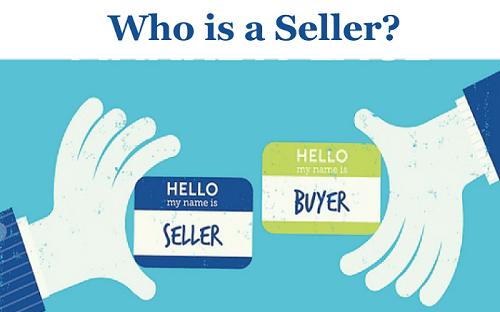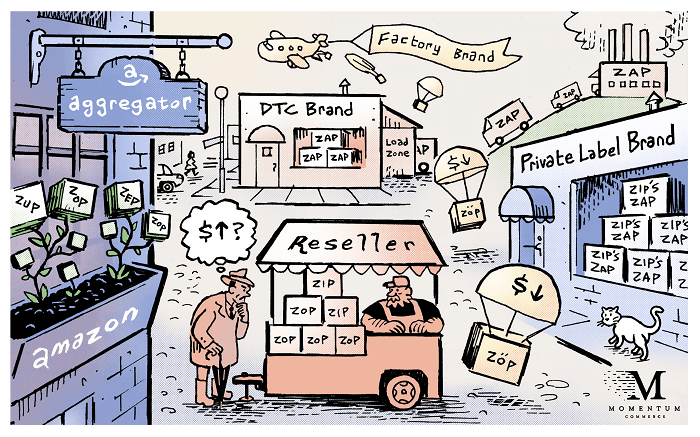SellerA seller is an individual, business, or entity that offers goods or services for sale in certain marketplaces. The role of a seller is to market and promote their products or services, negotiate prices and terms with buyers, fulfill orders, and build and maintain relationships with buyers. 
Sellers play an important role in the marketplace as they help to facilitate the exchange of goods and services between target buyers and manufacturers/ producers. Through their offerings and the prices they set, sellers help to determine the supply and demand for a particular product or service. They also play a crucial role in determining the overall price level and the allocation of resources in an economy. Sellers serve as intermediaries between producers and consumers, bringing goods and services to market and making them available to buyers. They also play an important role in promoting competition and innovation by offering new products, improving quality, and lowering prices. In this way, sellers play an important role in promoting economic growth and prosperity. What do sellers do?As a seller, one of the main responsibilities is to market and promote the products or services to attract new buyers as well as retain existing ones. This can be done through various marketing strategies such as advertising, promotions, public relations, and social media. The goal of marketing and promotion is to make the products or services more attractive and appealing to potential buyers, thereby increasing sales. Sellers also play an important role in negotiating prices and terms with buyers. This involves determining the price at which the goods or services will be sold and the terms under which they will be provided. This can involve negotiation on aspects such as payment methods, delivery times, and warranties. Fulfilling orders and delivering products or services is another important responsibility of sellers. This involves processing orders, packing, and shipping goods, and ensuring that the products or services are delivered to the buyer in a timely and satisfactory manner. Building and maintaining relationships with buyers is also an important aspect of being a seller. This involves creating a positive customer experience, addressing customer complaints and concerns, and providing ongoing customer support. By building strong relationships with buyers, sellers can foster customer loyalty and increase repeat business. Types of Seller(i) Retailers: Retailers are businesses that sell products directly to the end consumer. They purchase goods from wholesalers or manufacturers and sell them in small quantities to customers. Examples of retailers include department stores, supermarkets, and convenience stores. 
(ii) Wholesalers: Wholesalers are businesses that sell products to retailers in large quantities. They purchase goods in bulk from manufacturers and sell them to retailers at a higher price. Wholesalers play a crucial role in the supply chain, allowing retailers to purchase products at a lower cost and in larger quantities. (iii) Manufacturers: Manufacturers are businesses that produce products from raw materials or components. They may sell their products directly to retailers or wholesalers, or they may have their own retail stores. Examples of manufacturers include automobile companies and electronics manufacturers. (iv) Online Sellers: Online sellers are businesses that sell products and services through the internet. They may sell directly to consumers or to other businesses, and they often have a broader reach than brick-and-mortar retailers. Examples of online sellers include Amazon, eBay, and Etsy. (v) Direct Sellers: Direct sellers are businesses that sell products directly to customers through personal contact, typically in the customer's home. Examples of direct sellers include Avon, Mary Kay, and Tupperware. Direct sellers typically use a multi-level marketing model, where they earn commissions not only on their sales but also on the sales made by their recruits. Rights of SellersSellers have several rights that protect their interests in the marketplace. Some of these rights include:
Duties of SellerSellers have several duties and responsibilities in the marketplace. Some of these duties include:
Examples of a SellerAmazon: An Online SellerAmazon is one of the largest online retailers in the world, offering a wide range of products and services to customers. The company operates as an e-commerce platform, allowing other sellers to sell their products through the site in addition to its own products. 
Amazon is known for its easy-to-use interface, fast delivery, and extensive product offerings. Walmart as a Retail SellerWalmart is one of the largest retail chains in the world, operating thousands of stores in multiple countries. The company offers a wide range of products, including groceries, electronics, and home goods, at low prices. Walmart is known for its large-scale operations and its ability to offer products at low prices through its efficient supply chain and economies of scale. The company has recently expanded its online presence and now offers online ordering and delivery services to customers. Maximizing Sales Potential"Maximizing your sales potential" refers to the process of optimizing your efforts and resources in order to achieve the highest possible level or the number of sales. This can be achieved by a variety of means, including improving your product or service offerings, building a strong brand identity, leveraging technology and digital marketing strategies, and optimizing your sales process. One of the key factors in maximizing your sales potential is understanding your target audience and what motivates them to make a purchase. This requires market research and analysis, as well as customer feedback and engagement. By understanding your audience, you can better tailor your offerings and messaging to meet their needs and preferences. Another important aspect of maximizing sales potential is having a strong and efficient sales process. This can include everything from lead generation and nurturing to closing the sale and follow-up. By streamlining your sales process and eliminating bottlenecks and inefficiencies, you can increase your close rate and overall sales. Leveraging the Power of Social Media for SalesIt refers to the process of using social media platforms as a tool to drive sales and grow your business. With over 3 billion people using social media worldwide, it is a massive market that offers numerous opportunities for businesses to reach their target audience and drive conversions. There are several ways to leverage social media for sales, including:
By leveraging the power of social media, businesses can reach a large and diverse audience, build a strong brand identity, and drive sales and revenue. However, it's important to have a strategic and well-planned approach to social media marketing in order to achieve the best results. The Importance of Customer Service in SalesCustomer service is a crucial component of sales, as it can greatly impact a customer's overall experience and determine the likelihood of making a repeated purchase or going for another business. Good customer service can help establish trust and build relationships with customers, leading to increased customer satisfaction and loyalty. Some of the benefits of providing excellent customer service in sales include:
The Future of Selling in a Digital WorldThe selling of goods and services through a digital world using digital means is rapidly evolving, driven by advances in technology and changing consumer behavior. With more and more customers turning to online channels for purchases, it is critical for sellers and businesses to adapt to the new digital landscape to remain competitive and succeed in the future.
Next TopicTemporary New Account
|
 For Videos Join Our Youtube Channel: Join Now
For Videos Join Our Youtube Channel: Join Now
Feedback
- Send your Feedback to [email protected]
Help Others, Please Share









